初中英语复合句
初中英语语法主从复合句
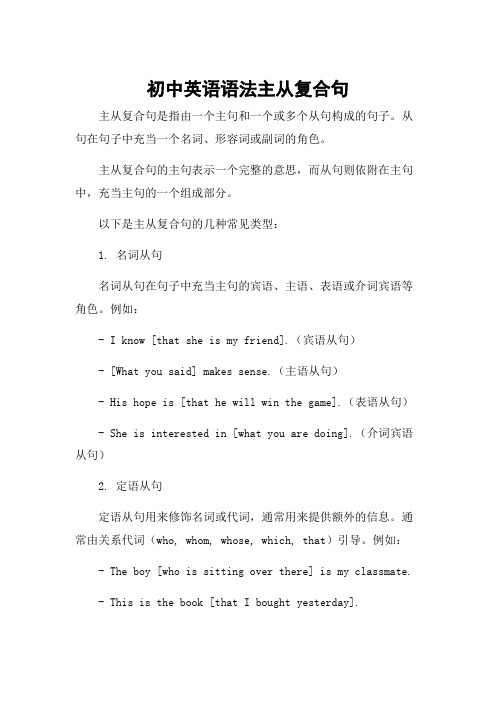
初中英语语法主从复合句主从复合句是指由一个主句和一个或多个从句构成的句子。
从句在句子中充当一个名词、形容词或副词的角色。
主从复合句的主句表示一个完整的意思,而从句则依附在主句中,充当主句的一个组成部分。
以下是主从复合句的几种常见类型:1. 名词从句名词从句在句子中充当主句的宾语、主语、表语或介词宾语等角色。
例如:- I know [that she is my friend].(宾语从句)- [What you said] makes sense.(主语从句)- His hope is [that he will win the game].(表语从句)- She is interested in [what you are doing].(介词宾语从句)2. 定语从句定语从句用来修饰名词或代词,通常用来提供额外的信息。
通常由关系代词(who, whom, whose, which, that)引导。
例如:- The boy [who is sitting over there] is my classmate.- This is the book [that I bought yesterday].- The woman [whose car was stolen] reported it to the police.3. 状语从句状语从句用来修饰主句中的动词,形容词或副词,提供额外的信息。
常见的状语从句有时间状语从句、原因状语从句、结果状语从句、条件状语从句和方式状语从句等。
例如:- She went to bed [after she finished her homework].(时间状语从句)- He failed the exam [because he didn't study].(原因状语从句)- They are so tired [that they can't walk anymore].(结果状语从句)- If it rains tomorrow, [we will stay at home].(条件状语从句)- He did it [in the way that she had instructed].(方式状语从句)以上是主从复合句的几种常见类型,。
初中英语复合句专题复习
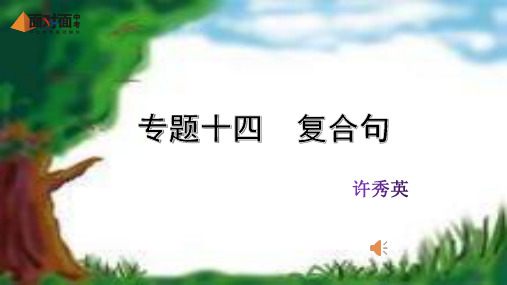
真
C. where the station’s waiting room is
题
D. where the station’s waiting room was
专题十四 复合句
返回目录
2.(2019曲靖35题)—Could you please tell me ___C____?
—Yes, you can take bus No.5 or just take a taxi. It is not
二、关联词 宾语从句表示陈述意义时,由that 引导,没
有实际意义, that 可省略
I think (that) mooncakes are delicious!
宾语从句表示特殊疑问意义时,由特殊疑问 词(组)what, where, who,whom,whose,how long 等作连接词。
• She never knew what she was supposed to do at the
dinner table. 她不知道在餐桌上该做什么
3、真金不怕火来炼:主句使用一般过去时,但从句 表示的是客观真理、自然现象时、从句仍用一般现 在时。
• Miss Hu said that the earth goes around the sun. 胡 老师说地 球绕着太阳转
注意
在介词之后,动词不定式之前,与or not连用, 由if 引导的条件状语从句,从句是否定句,这些情况只 用whether,不用if。
(1). I can’t decide whether to buy this bike or not. (2). I’m thinking of whether we should go to see the film.
初中英语-复合句详解
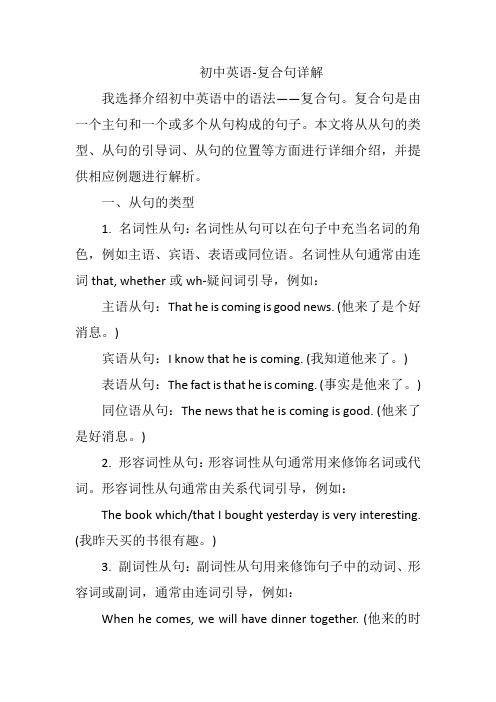
初中英语-复合句详解我选择介绍初中英语中的语法——复合句。
复合句是由一个主句和一个或多个从句构成的句子。
本文将从从句的类型、从句的引导词、从句的位置等方面进行详细介绍,并提供相应例题进行解析。
一、从句的类型1. 名词性从句:名词性从句可以在句子中充当名词的角色,例如主语、宾语、表语或同位语。
名词性从句通常由连词that, whether或wh-疑问词引导,例如:主语从句:That he is coming is good news. (他来了是个好消息。
)宾语从句:I know that he is coming. (我知道他来了。
)表语从句:The fact is that he is coming. (事实是他来了。
)同位语从句:The news that he is coming is good. (他来了是好消息。
)2. 形容词性从句:形容词性从句通常用来修饰名词或代词。
形容词性从句通常由关系代词引导,例如:The book which/that I bought yesterday is very interesting. (我昨天买的书很有趣。
)3. 副词性从句:副词性从句用来修饰句子中的动词、形容词或副词,通常由连词引导,例如:When he comes, we will have dinner together. (他来的时候,我们一起吃晚饭。
)I am happy because I passed the exam. (我很开心,因为我通过了考试。
)二、从句的引导词1. 连词:连词用于连接主句和从句,常见的连词有:that、whether、if、because、since、although、while、when、where、because等。
例如:I know that she is coming. (我知道她来了。
)2. 关系代词:关系代词用于引导形容词性从句,常见的关系代词有:who、whom、whose、which、that等。
初中英语-复合句

初中英语-复合句初中英语语法--复合句本部分内容是中考中必考及常考考点。
考点详解:从句的概念:一个句子在另一个句子中充当成分,充当什么成分就做什么状语。
一、宾语从句1、宾语从句的引导词宾语从句是陈述句时,常用that引导。
在口语中和非正式语言中,可以省略that。
例如:___ us (that) we will have an English test tomorrow.如果宾语从句由一般疑问句转换而来,其引导词用if或whether。
一般情况下,二者可以通用,但从句中有or not或从句充当介词的宾语时,只用whether。
例如:I don’t knowif/whether she will come here。
Sorry。
I don’t know whether hewill come or not.宾语从句是特殊疑问词时,引导词就是特殊疑问词。
例如:Could you tell me where the post office is。
The teacher asked the students what they were doing.2、宾语从句的时态主句的时态是一般现在时,从句的谓语动词的时态要根据具体的情况用相应的任何时态。
例如:Do you know who was talking with at 8 o’clock last night?主句的时态为一般过去时,从句的谓语动词要用相应的某一过去时态。
例如:___ me that he had been to ___.从句表示的是客观真理、普遍现象、自然现象时,从句的时态一律使用一般现在时。
例如:She said the sun rises in the east.3、宾语从句的语序在含有宾语从句的复合句中,宾语从句要使用陈述句语序,“引导词+主语+谓语+其他”。
例如:I want to know when the train left.从句原因状语从句结果状语从句比较状语从句方式状语从句地点状语从句1、疑问句转宾语从句当疑问句由do。
初中英语-复合句
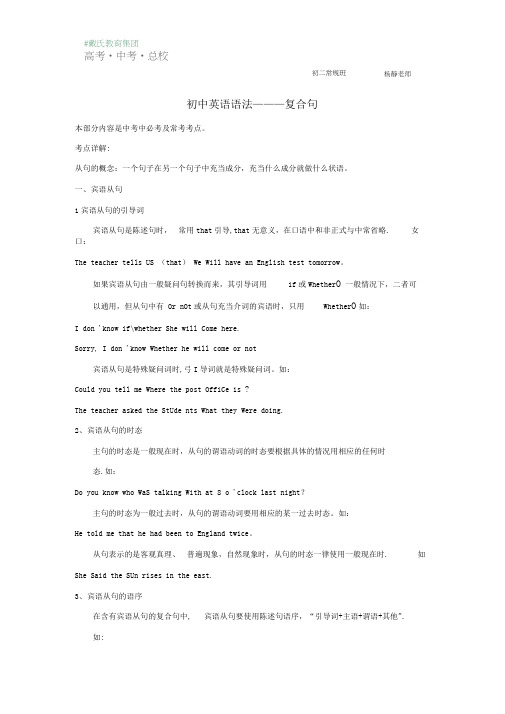
初二常规班杨静老师初中英语语法———复合句本部分内容是中考中必考及常考考点。
考点详解:从句的概念:一个句子在另一个句子中充当成分,充当什么成分就做什么状语。
一、宾语从句1宾语从句的引导词宾语从句是陈述句时,常用that引导,that无意义,在口语中和非正式与中常省略. 女口:The teacher tells US (that) We Will have an English test tomorrow。
如果宾语从句由一般疑问句转换而来,其引导词用if或Whether O 一般情况下,二者可以通用,但从句中有 Or nOt或从句充当介词的宾语时,只用Whether O如:I don 'know if\whether She will Come here.Sorry, I don 'know Whether he will come or not宾语从句是特殊疑问词时,弓I导词就是特殊疑问词。
如:Could you tell me Where the post OffiCe is ?The teacher asked the StUde nts What they Were doing.2、宾语从句的时态主句的时态是一般现在时,从句的谓语动词的时态要根据具体的情况用相应的任何时态.如:Do you know who WaS talking With at 8 o 'clock last night?主句的时态为一般过去时,从句的谓语动词要用相应的某一过去时态。
如:He told me that he had been to England twice。
从句表示的是客观真理、普遍现象,自然现象时,从句的时态一律使用一般现在时. 如She Said the SUn rises in the east.3、宾语从句的语序在含有宾语从句的复合句中, 宾语从句要使用陈述句语序,“引导词+主语+谓语+其他".如:I Want to know When the train left.由do,does,did构成的疑问句,在装换成宾语从句时,要去电 do,does,did,且从句中的谓初二常规班杨静老师语动词要根据主句时态作出相应的变化。
(完整版)初中英语-复合句
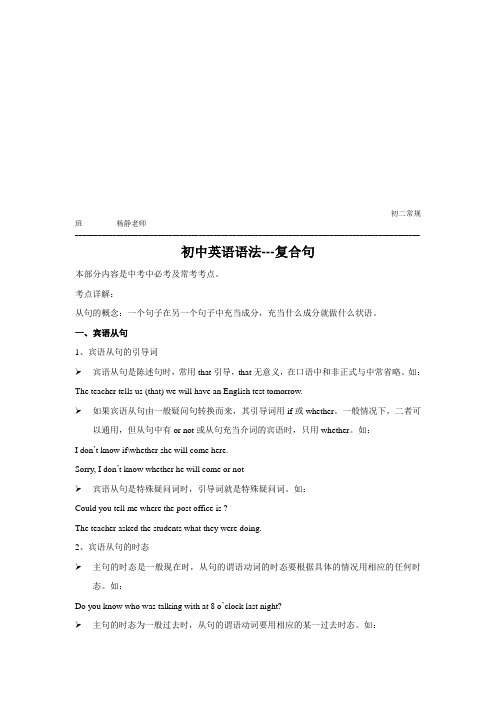
初二常规班杨静老师____________________________________________________________________________________________初中英语语法---复合句本部分内容是中考中必考及常考考点。
考点详解:从句的概念:一个句子在另一个句子中充当成分,充当什么成分就做什么状语。
一、宾语从句1、宾语从句的引导词➢宾语从句是陈述句时,常用that引导,that无意义,在口语中和非正式与中常省略。
如:The teacher tells us (that) we will have an English test tomorrow.➢如果宾语从句由一般疑问句转换而来,其引导词用if或whether。
一般情况下,二者可以通用,但从句中有or not或从句充当介词的宾语时,只用whether。
如:I don’t know if\whether she will come here.Sorry, I don’t know whether he will come or not➢宾语从句是特殊疑问词时,引导词就是特殊疑问词。
如:Could you tell me where the post office is ?The teacher asked the students what they were doing.2、宾语从句的时态➢主句的时态是一般现在时,从句的谓语动词的时态要根据具体的情况用相应的任何时态。
如:Do you know who was talking with at 8 o’clock last night?➢主句的时态为一般过去时,从句的谓语动词要用相应的某一过去时态。
如:初二常规班杨静老师____________________________________________________________________________________________ He told me that he had been to England twice.➢从句表示的是客观真理、普遍现象,自然现象时,从句的时态一律使用一般现在时。
初中英语复合句讲解及例句
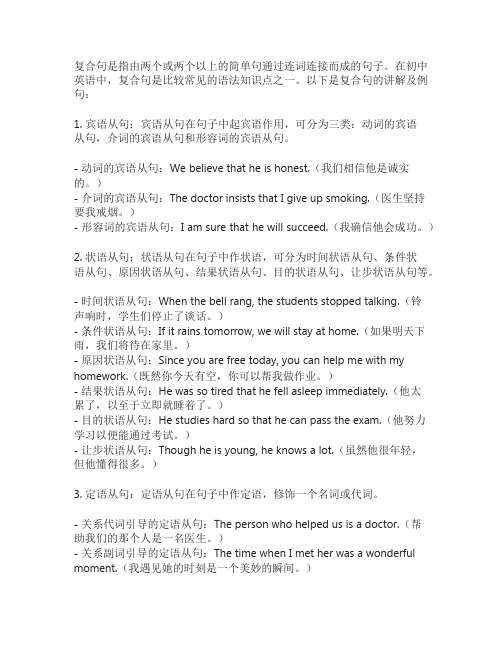
复合句是指由两个或两个以上的简单句通过连词连接而成的句子。
在初中英语中,复合句是比较常见的语法知识点之一。
以下是复合句的讲解及例句:1. 宾语从句:宾语从句在句子中起宾语作用,可分为三类:动词的宾语从句,介词的宾语从句和形容词的宾语从句。
- 动词的宾语从句:We believe that he is honest.(我们相信他是诚实的。
)- 介词的宾语从句:The doctor insists that I give up smoking.(医生坚持要我戒烟。
)- 形容词的宾语从句:I am sure that he will succeed.(我确信他会成功。
)2. 状语从句:状语从句在句子中作状语,可分为时间状语从句、条件状语从句、原因状语从句、结果状语从句、目的状语从句、让步状语从句等。
- 时间状语从句:When the bell rang, the students stopped talking.(铃声响时,学生们停止了谈话。
)- 条件状语从句:If it rains tomorrow, we will stay at home.(如果明天下雨,我们将待在家里。
)- 原因状语从句:Since you are free today, you can help me with my homework.(既然你今天有空,你可以帮我做作业。
)- 结果状语从句:He was so tired that he fell asleep immediately.(他太累了,以至于立即就睡着了。
)- 目的状语从句:He studies hard so that he can pass the exam.(他努力学习以便能通过考试。
)- 让步状语从句:Though he is young, he knows a lot.(虽然他很年轻,但他懂得很多。
)3. 定语从句:定语从句在句子中作定语,修饰一个名词或代词。
初中英语知识点归纳复合句的分类和用法
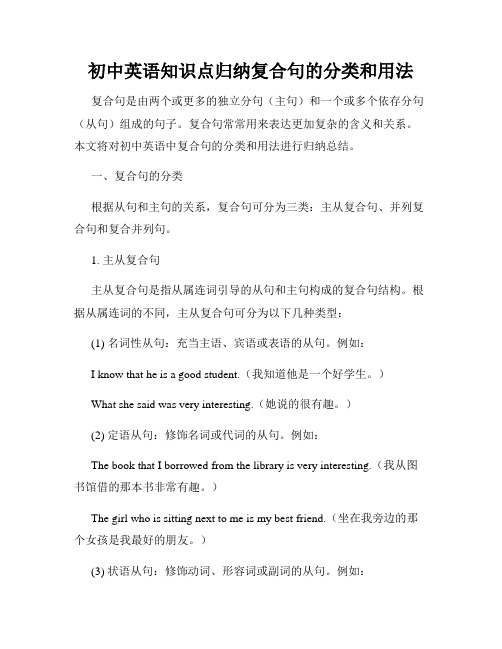
初中英语知识点归纳复合句的分类和用法复合句是由两个或更多的独立分句(主句)和一个或多个依存分句(从句)组成的句子。
复合句常常用来表达更加复杂的含义和关系。
本文将对初中英语中复合句的分类和用法进行归纳总结。
一、复合句的分类根据从句和主句的关系,复合句可分为三类:主从复合句、并列复合句和复合并列句。
1. 主从复合句主从复合句是指从属连词引导的从句和主句构成的复合句结构。
根据从属连词的不同,主从复合句可分为以下几种类型:(1) 名词性从句:充当主语、宾语或表语的从句。
例如:I know that he is a good student.(我知道他是一个好学生。
)What she said was very interesting.(她说的很有趣。
)(2) 定语从句:修饰名词或代词的从句。
例如:The book that I borrowed from the library is very interesting.(我从图书馆借的那本书非常有趣。
)The girl who is sitting next to me is my best friend.(坐在我旁边的那个女孩是我最好的朋友。
)(3) 状语从句:修饰动词、形容词或副词的从句。
例如:He will call me when he arrives.(他到达时会给我打电话。
)She is happy because she passed the exam.(她因为通过了考试而很开心。
)2. 并列复合句并列复合句是由两个或更多的并列分句构成的复合句结构,表示并列关系。
主要有以下几种形式:(1) 并列连词连接:用于连接并列分句的连词有and、or、but等。
例如:I like apples and she likes oranges.(我喜欢苹果,她喜欢橙子。
)You can go home or you can stay here.(你可以回家或者留在这里。
- 1、下载文档前请自行甄别文档内容的完整性,平台不提供额外的编辑、内容补充、找答案等附加服务。
- 2、"仅部分预览"的文档,不可在线预览部分如存在完整性等问题,可反馈申请退款(可完整预览的文档不适用该条件!)。
- 3、如文档侵犯您的权益,请联系客服反馈,我们会尽快为您处理(人工客服工作时间:9:00-18:30)。
初中重点语法从句按其在复合句中的作用,分为主语从句、表语从句、宾语从句、定语从句和状语从句等。
(参见以下各条)3、各从句在句子中的位置以及用法:(1) 表语从句:在句子中作连系动词的表语的从句,它位于主句中的系动词之后。
例如:That is why he did not come to school yesterday. / It is because you are so clever.(2) 宾语从句:在句子中作及物动词或介词的宾语。
①基本形式:(主句+)连词+从句主语+从句谓语+...②关于宾语从句连词的选择:若从句来源于一个陈述句,那么,连词用that,在口语中that可以省略;若从句来源于一个一般疑问句,连词则用if 或whether;若从句来源于一个特殊疑问句,则连词就是疑问词(如what,who,where,when等) 例如:They believe that the computer will finally take the place of human beings.(他们相信计算机终将代替人类。
) (从句本来就是陈述句)/ I wonder whether I should say something for him to theheadmaster.(我不知道是不是该为他在校长跟前说点什么。
) (从句来源于一般问句Shall I saysomething for him to the headmaster?) / He asked me where he could get such medicine. (他问我在哪儿能搞到那样的药。
) (从句来源于特殊问句Where can he get such medicine? )③宾语从句的时态问题:如果主句是现在时,从句则用现在某一时态,甚至可以用过去时;如主句是过去时,从句则相应地使用过去某一时态,遇到客观真理时仍然用现在时。
如:I think Iwill do better in English this term. (我想本学期我的英语会学得好点。
) / The teacher asked the boyif the earth is round. (老师问那个男孩地球是不是圆的。
)④下列结构后面的从句一般也作为宾语从句看待:be sorry / afraid / sure / glad +that从句,如:I’m sorry I’m late. (对不起,我迟到了。
) / I’m afraid heisn’t in at the moment. (恐怕他此刻不在家。
)(3) 状语从句:在复合句中作状语,其位置可以在主句前或主句后。
状语从句可以分为时间、地点、原因、目的、结果、比较、让步、条件等几种。
状语从句由从属连接词引导。
时间状语从句通常由when ,as ,while, after, before, since, as soon as ,since, till (until), while, whenever 等引导。
时间状语从句一般放在句首或句尾,特别注意,时间状语从句不允许使用将来时,而应该用现在时替代。
如:When you finish the work, you may go out to play with Sam. (你完成工作就可以出去和Jim一起玩了。
) / I won’t leave until Mum comes back. (妈妈回来了我才会走。
) 地点状语从句通常由where, wherever等引导。
如:Go back where you came from! (哪里来还滚到哪里去!) / I will never forget to catch the thief who stole my necklace wherever he may be. (我永远也不会忘记去抓住那个偷我项链的贼,无论他会在哪里。
)原因状语从句通常由because, since, as等引导,一般放在句首或句尾。
如:He went abroad because his father had found a good university for him. (他出国了,因为他父亲给他找了一所好大学。
) 目的状语从句通常由so that..., so...hat..., in order that...等引导,往往放在句尾,从句中通常含有can / could / may / might等情态动词。
如:He got up earlier so that he could catch the first train. (他起身更早为的是赶上第一班车。
)结果状语从句通常由so that..., so...that... 等引导,放在句尾。
结果状语从句一般表示已经发生的事情,故多为过去时态。
如:He lost so many bikes that he decided never to buy a new one. (他丢了那么多辆自行车,他决定再也不买新车了。
)比较状语从句通常由as, than, as (so)...as等引导,一般省略从句的谓语部分,只剩下名词或代词(用主格或宾格均可)。
如:Jane is much taller than I/me. (Jane比我高多了。
) / I don’t have as many booksas you (do). (我书没有你多)让步状语从句通常由though (although), as, even if( even though), however, whatever等引导。
如:Even if you pay the debt(债务) for me, I will not thank you because it has nothing to do with me. (即使你替我还了债我也不会感谢你,因为它与我毫无关系。
) / He wears a T-shirt though it is very cold. (他穿了一件T恤衫,尽管天很冷。
)条件状语从句通常由if, unless, as long as等引导,条件状语从句一般放在句首或句尾,特别注意,时间状语从句不允许使用将来时,而应该用现在时替代。
You will certainly fail in the coming final examsunless you work much harder. (即将来到的期末考试你肯定考不及格,除非你更用功。
) / If it doesn’t rain tomorrow, we shall go hiking. (如果明天不下雨我们就要去徒步旅行。
)[注意] 1、because与so;(al)though与but;if与so不可以同在一个句子中成对出现。
2、时间、条件、原因,让步状语从句放在句首时需要用逗号与主句隔开。
(4) 定语从句:在复合句中作定语用修饰句子中某一名词或代词的从句叫定语从句。
①定语从句的位置:放在名词或代词的后面。
如:The man who has an umbrella in his hand is my uncle.(手上抓了一把雨伞的人是我的叔叔。
)②语法术语的改变:被修饰的名词或代词称为先行词;引导定语从句的连接词称为关系词,其中that、which、who称为关系代词,where、when、how称为关系副词。
③关系代词或关系副词的作用:关系代词who、whom和whose指人,分别在从句中作主语、宾语和定语。
which指物that多指物,有时也指人,它们在从句中可以作主语或宾语。
定语从句中关系代词作从句宾语时可以省略。
Thisis the thief (that/who/whom) we have been looking for these days. (这个就是我们近日一直在找的小偷。
) / Please find a room which is big enough for all of us to live in. (请找一间足够大能住下我们全体的房间。
)关系副词when或where引导定语从句时,它们在从句中分别作时间状语和地点状语。
如:This is theroom where they had a quarrel a week ago. (这是一个星期前他们吵架的房间。
) / I can never forgetthe day when I first saw you. (我永远不会忘记第一次见到你的日子。
)④限制性定语从句和非限制性定语从句。
限制性定语从句在句中不能省略,否则主句意思就不完整。
非限制性定语从句和主句之间往往用逗号分开,这种从句是一种附加说明,如果从句子中省去,也不致于影响主句的意思。
如:She spent the whole evening talking about her latest book, which noneof us had heard of. (她一个晚上都在谈论她最近的书,我们一个人都没有听说过那本书。
)[注解]1、关系代词只能用that的情况:当先行词是指事物的不定代词(all, anything等),或先行词部分含有最高级,或含有序数词时,不能用其他的关系代词,只能用that. 如:All that Lily told me seemsuntrue. (Lily告诉我的话似乎不真实。
) / Can you give me anything that has no sugar inside? (能不能给我点里面没有糖的东西?) / This is the first two-story bus that runs in our city. (这是第一辆运行于我市的双层公交车。
)2、关系代词在从句中作主语时一般用who(指人)、that(指物),而不用that指人或用which指物。
如:Do you know the woman who is weeping in the corner? (你认识那个在角落里哭泣的女人吗?) /Do not tell me any words that have nothing to do with me. (跟我无关的话,请一个字也不要说。
)3、关系代词作从句的宾语时,常用which或whom,较少使用that或who,而且,关系代词常常省略。
如:Tom’s father was the first parent whom our teacher talked to. (Tom的父亲是我们老师第一个谈话的人。
